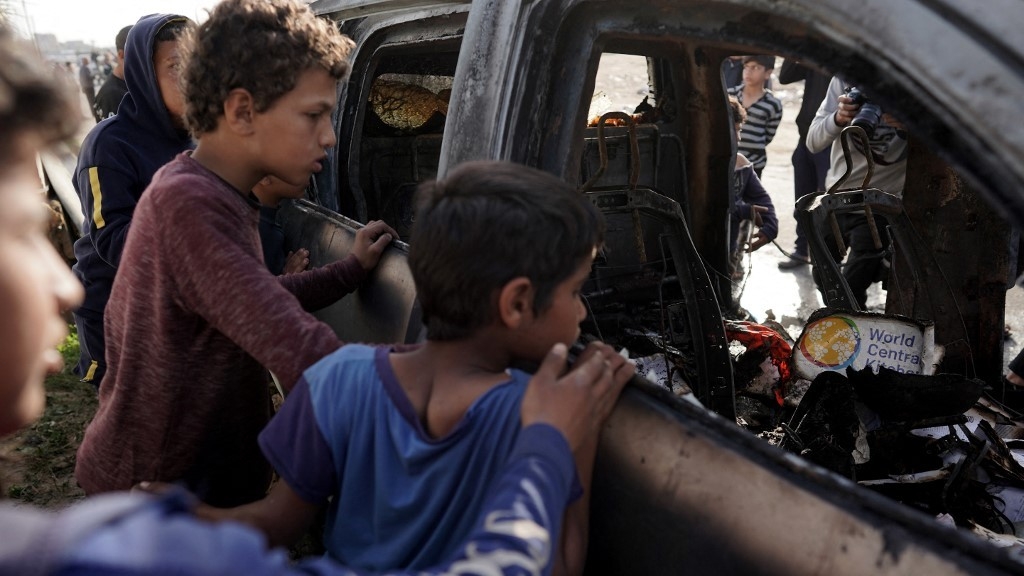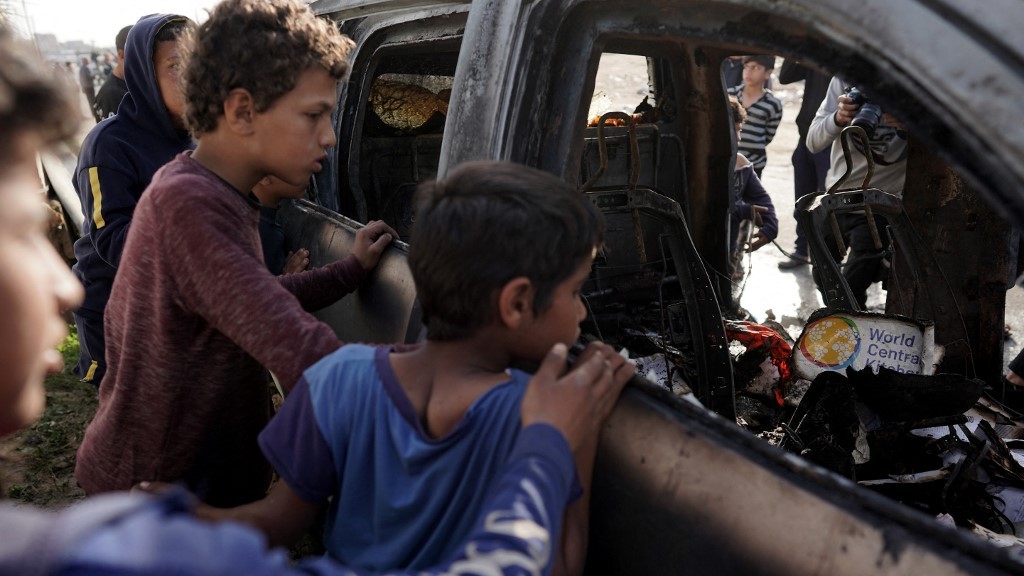How Israel’s Gaza aid convoy attack brings Palestinians closer to famine

The Israeli attack that killed seven aid workers from the World Central Kitchen (WCK) on Monday is yet another blow to efforts to bring aid to the starving population of the Gaza Strip.
The attack killed WCK’s entire operations team in Gaza, prompting the organisation to suspend its operations.
“The World Central Kitchen is a critical organisation feeding half a million people each day with hot meals,” a media spokesperson for the World Food Programme (WFP) in Gaza said. “We can’t afford to lose that.”
The WFP provides food to approximately 1.45 million displaced people in Gaza each month, while the United Nations Relief and Works Agency (Unrwa) supplies meals to over a million people monthly.
The amount of hot meals WCK had been providing in Gaza in recent months was larger than the two UN agencies combined.
Since the beginning of the war, WCK has provided at least 43 million meals to Palestinians in Gaza through aid delivered by land, sea and air. This has been done in collaboration with other humanitarian organisations, including WFP, Unrwa, the UN Office for the Coordination of Humanitarian Affairs (Ocha), Middle East Children’s Alliance (Meca) and American Near East Refugee Aid (Anera).
“Between us we are trying to push back this famine and stop it in its tracks. But it’s a team effort,” the WFP said in a statement to Middle East Eye. “It will only work if all of us are able to do our work and do it safely.”
As Israel continues to close land crossings and restrict aid entering from Egypt’s Rafah crossing, WCK has pioneered efforts to bring aid to Gaza via a maritime corridor dubbed Operation Safeena.
Operation Safeena has so far delivered around 200 tons of food to northern Gaza, where the population is facing severe levels of hunger.
The organisation built a makeshift jetty from the rubble of destroyed buildings to facilitate the sea deliveries. The first shipment, which set sail from Cyprus, arrived in mid-March. It was the first time in two decades that humanitarian shipments were delivered to Gaza by sea.
‘Between us we are trying to push back this famine and stop it in its tracks. But it’s a team effort’
– World Food Programme
A second shipment from Cyprus arrived in Gaza earlier this week. The convoy included three ships and a barge carrying hundreds of tons of food, and heavy machinery to expedite the offloading process and deliver aid as quickly as possible.
The WCK team had offloaded about 100 tons from these ships, hours before Monday’s attack.
The organisation said the latest shipment had enough food to prepare more than one million meals. But Cyprus said the rest of the shipment will have to return to Cyprus, with 240 tons of aid undelivered.
WCK and other aid groups have emphasised, however, that opening land crossings remains the most effective way to prevent famine in Gaza.
Celebrity chef José Andrés, WCK’s founder, has repeatedly called for a ceasefire in Gaza and the opening of land crossings.
Another group halts operations
On Tuesday, Anera, one of the largest aid groups operating in Gaza, announced that it was also pausing its work, as it was no longer feasible for its staff to deliver aid without significant risk to their safety.
Anera has provided an average of 150,000 meals every day in Gaza since the beginning of the current hostilities on 7 October. It said that the suspension of its work is expected to have “severe consequences” for starving Palestinians.
Last week, the International Court of Justice ordered Israel, in a legally binding decision, to “ensure, without delay” that humanitarian aid is provided to Gaza, including essentials such as food, water, electricity, and other fundamental necessities.
Anera said the WCK attack constituted a “clear violation” of the ICJ’s decision.
The additional provisional measures ordered by the UN’s top court came amid several deaths by starvation and warnings by the UN and international NGOs of imminent “man-made” famine in the Gaza Strip due to Israel’s prevention of the entry of aid through land crossings.
The court said that Palestinians in Gaza are not only facing a risk of famine “but that famine is setting in”.
The UN Security Council also passed a resolution on 25 March calling for a ceasefire and the unhindered entry of aid to Gaza.
The UN’s Ocha estimates that Israeli authorities have denied 30 percent of humanitarian aid missions to northern Gaza since the beginning of March.
A report by the Integrated Food Security Phase Classification, a UN-backed initiative, found last month that the entire population of Gaza, estimated to be around 2.3 million, is enduring “acute” food insecurity, while half the population suffers from a greater level of food insecurity classified as “catastrophic”.
The report concluded that the hunger level in Gaza is the “highest share of people facing high levels of acute food insecurity that the IPC initiative has ever classified for any given area or country”.
WCK aid workers are not the first to be killed in Israeli attacks.
At least 176 staff members of Unrwa, the largest humanitarian organisation operating in Gaza, have been killed by Israeli forces since 7 October. Israeli attacks have also killed Palestinian officials in charge of coordinating aid deliveries in Gaza.
Meanwhile, in recent months, Israeli forces have killed over 400 Palestinians in northern Gaza as they gathered to collect aid from trucks arriving from the south.


